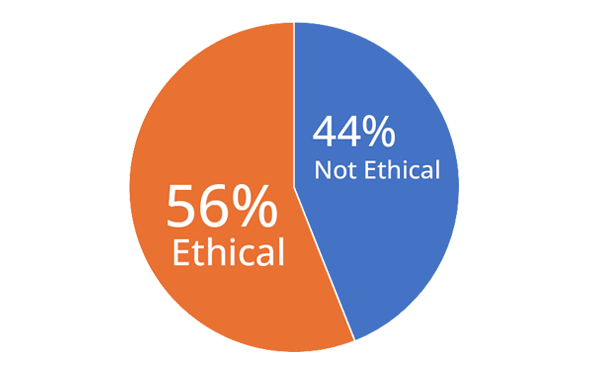This is the December 2023 edition of our monthly series of Ethics case studies titled What Do You Think? This series is comprised of case studies from NSPE archives, involving both real and hypothetical matters submitted by engineers, public officials and members of the public.
Your peers and the NSPE Board of Ethical Review have reviewed the facts of the case as shown below. And, here are the results.
Your opinion has been registered for the December 2023 edition of our monthly series of Ethics case studies titled What Do You Think?
Your vote is recorded as:

Want to know how your peers voted? We’ll send you an email with the poll results on
December 26.
December 26.
Your opinion has been registered for the December 2023 edition of our monthly series of Ethics case studies titled What Do You Think?
Your vote is recorded as:

Want to know how your peers voted? We’ll send you an email with the poll results on
December 26.
December 26.
A Review of the Facts
Engineer Raymond received an unsolicited letter and explanatory material from a commercial firm engaged in manpower placement, offering a monetary bonus to Raymond if he provided names of qualified engineers (and other technical disciplines listed in the brochure) who were subsequently employed by others through the services of the commercial firm.
The amount of bonus was indicated as ranging from $1000 (designers, specifications writers, estimators) to $5000 (chief engineer, director of projects, etc.). Engineers, as such, were listed as worth a $2000 bonus. The covering letter stated that there were presently openings for this type of personnel in several client companies of the placement firm. It further stated that these prospective employers offer highly competitive salaries and liberal benefit packages.
Raymond has submitted the case for comment on the ethical aspects of this type of personnel operation, recognized in the solicitation letter of the commercial firm as “a highly novel approach to personnel recruitment.” Although the facts submitted do not so state, we assume for the purposes of this case that the prospective employer firms have indicated a willingness to employ engineering personnel under the described method, and that in doing so have agreed to pay through the commercial firm the amount of the bonus in addition to other fees charged by the commercial firm.
What Do You Think?
Would it be ethical for Raymond to submit names of prospective employees under the described method?
Here is the result of our survey of your peers:

Applicable NSPE Code References:
III.1.d
Engineers shall not attempt to attract an engineer from another employer by false or misleading pretenses.III.1.e
Engineers shall not promote their own interest at the expense of the dignity and integrity of the profession.
Discussion
We previously considered in Case 68-4 a similar set of facts; the main difference being, however, that the solicitation was directly from an engineering firm to engineers employed in another firm, but without any offer of bonus or other special payments to either the engineers being contacted or the present employer.
At the time we considered Case 68-4 the pertinent Code provision stated that an engineer will not attempt to attract an engineer from another employer “by unfair methods. ” The discussion of that case commented on the lack of definition of “unfair.” The present Code provision, quoted above, turns away from the “unfair” test and in its place relies upon the use of “false or misleading pretenses.”
Our conclusion in Case 68-4 was to the effect that the facts did not warrant a finding of unethical conduct, but we noted that an effort by one engineering firm to attract employees away from their present employer without any indication of interest from those employees “is not in keeping with desirable professional standards and the proper relationship between firms within the profession.”
We further commented in that case that this type of activity should be judged under a concept of professional courtesy, and that the proper concept should be to use recruitment procedures whereby an employed engineer takes the initiative in making contact with other prospective employers, either directly or by responding to advertisements or other similar means of recruitment interest.
In a related subsequent case (69-3) we held that it was ethical for an engineering organization to solicit new employees through use of a management consulting firm, which distributed an outline of job specifications for the client firm (without disclosing its name) inviting the recipient organization to advise if they knew of anyone meeting the specifications who might be interested in such openings for employment. We noted in that discussion, however, that the conclusion might have been different if the prospective employer or its agent (the management firm) had sought to induce an employee away from his present employment.
In a still further related case (69-5) we held that it was unethical for engineers in a company to accept a bonus offered by the employer to any engineer who submitted the names of other engineers employed elsewhere and who were hired by the company as a result of the reference. In reaching that conclusion, we stated that the method used came very close to the “pirating” of engineers by competing employers. “The concept of paying a bonus to engineering employees to induce, entice, or encourage other engineers away from their current employment has the ring of commercialism. It goes beyond the concept of an engineer-employee being a faithful agent of his employer.”
In all of these cases we have emphasized that employed engineers have the absolute right to change employment as desired and that nothing in the Code attempts to restrict that right. But our basic approach in dealing with these “fine line” cases has been that whatever method of recruitment is used the initiative for the change in employment should come from the employed engineer.
In the case before us we deal only with the ethics of Raymond in accepting or declining to submit names of prospective employees in return for monetary benefit to him.
Applying the ethical principles set forth in the earlier cases to this particular set of facts, we cannot find that there are any “false or misleading” statements in the solicitation literature, or that Raymond would be guilty of “false or misleading pretenses” if he went along with the scheme to obtain the bonus.
We continue to look with disfavor on a procedure that lends itself to a less-than-professional approach to professional employment. We recognize the competitive aspects of personnel recruitment among firms, but nevertheless adhere to our view that a proper professional relationship calls for a change in employment initiative to come from the employee and that such decisions not be the subject of outside inducements or the tawdry use of financial bonuses to those who engage in a form of “flesh peddling” for monetary gain.
For Raymond to be a party to this kind of arrangement for monetary benefit would constitute an act on his part for his own interest. Whether that act would be at the expense of the dignity and integrity of the profession may be in the “gray” area, but we think that the ulterior motive coupled with what is at best a questionable practice would tend to expose the engineering profession to an unfortunate perception: that its members are willing to sacrifice the principles noted above for selfish gain, and thereby create an image of participation in a form of “flesh peddling” whereby engineers are treated as objects rather than on their own professional merits, and who are motivated by their own initiatives as to employment opportunity.
The Ethical Review Board’s Conclusion

It would be unethical for Raymond to submit a list of prospective employees under the described method.
BOARD OF ETHICAL REVIEW
Ernest C. James, P.E. Lawrence E. Jones, P.E. Robert H. Perrine, P.E. James L. Polk, P.E. J. Kent Roberts, P.E. Alfred H. Samborn, P.E. F. Wendell Beard, P.E., chairman
Note – In regard to the question of application of the Code to corporations vis-a-vis real persons, business form or type should not negate nor influence conformance of individuals to the Code. The Code deals with professional services, which services must be performed by real persons. Real persons in turn establish and implement policies within business structures. The Code is clearly written to apply to the Engineer and it is incumbent on a member of NSPE to endeavor to live up to its provisions. This applies to all pertinent sections of the Code. This opinion is based on data submitted to the Board of Ethical Review and does not necessarily represent all of the pertinent facts when applied to a specific case. This opinion is for educational purposes only and should not be construed as expressing any opinion on the ethics of specific individuals. This opinion may be reprinted without further permission, provided that this statement is included before or after the text of the case.









There are a number of very large consulting firms which offer bonus to existing staff for recommendations for potential staff members to join the firm. Usually there is a caveat that the new member needs to remain at the new firm for a year before the bonus is paid out.
It’s a well known fact that the US military uses this same scheme to recruit new soldiers and officers. The pay schedule of military recruiters is substantially dependent upon bonuses received from recruiting and enlisting new individuals. Current soldiers and officers who direct an individual to a recruiter also receive a monetary bonus. I was actually fought over by two recruiters, like dogs at dinnertime, they both tried to claim me. The person who brought me to the recruiter received money for me too. I know just because they do it doesn’t make it right. However, if the board of engineers decides it’s unethical, what does that say about the entire US military system?
I had a recruiter reach out to me using my work email. When I responded and questioned the ethics of using a company’s email to attempt to recruit their employees to another firm, their response was that it was standard practice. I replied with a simple question, “Whose standards?”, and blocked them.
I have no issues with the practice.
Most engineers are not particularly good at self-promotion. It tends to go against our typically quiet nature. We also don’t tend to job-hop as much as many in other professions. As a result, our pay gains often diminish compared to many of our professional peers within a company.
An HR VP once told me he didn’t need to worry about engineer pay raises much because after seven years, his engineers aren’t going anywhere. This is good for the company, but not the engineer and his/her family. It also shows a lack of respect by management.
Given that, and that one should hold a much higher ethical standard towards their family than an employer, I see no issue with the practice. An employee’s loyalty to a company should always be measured against the company’s loyalty to the employee. Too often, it’s not an even two-way street.
I’m a strong supporter of practices that can raise both compensation for individual engineers and respect for engineers as a whole.
In the course of my fifty-plus years of engineering practice in all facets of Civil Engineering, including serving on the Kentucky Board of Licensure for Professional Engineers and Land Surveyors for eight years, I have never encountered this situation discussed or determined to be unethical.
The National Council of Engineering Examiners provides all the member licensing boards with a Model Law which can be adopted in whole or part. Most state boards have chosen to adopt the Model Law as their governing law with minor customization to meet the individual state board’s needs.
The Model Law, Section 240.15, Rules of Professional Conduct which covers (A) Licensee’s Obligation to the Public, (B) Licensee’s Obligation to the Employer and Clients, and (C) Licensee’s Obligation to other Licensee’s. Since this is the only law regarding our responsibilities and obligations in order to keep our licenses, we may need to be using this standard to judge these cases..
All employment is at will. Simply providing the names of individuals that might be seeking a new position can hardly be seen as in violation of the code. There was no mention whether these individuals worked at the same concern as the engineer which I would agree would be non-compliance. They might have been college pals, etc. Would a finders fee of $100 change the opinion of the board…?
Engineers are already treated as objects, at least in this writer’s limited experience, and that is not likely to change soon. If an engineer decides that it is time to find a better situation, how would they go about it? An engineer who initiates outreach to a “flesh peddler” (because that is who controls access to open positions) is diminished in value in the eyes of the recruiter. The most desirable candidates are those who are “found” by the recruiter. The bonus premium payment system offers a means for engineers who seek to change affiliations to get into the game, without diminishing their own value. When someone is ready to make a change, often their close colleagues and associates will have a sense of that. Large sums change hands when a recruiter places a candidate. A modest (but more than token) referral bonus might filter in favor of substantial, full-service recruiting firms, as opposed to fly-by-night name sellers, who make recruiting look like a tawdry business. Two thousand dollars sounds about right to thank the referrer for their initiative. They will also enjoy the satisfaction of having helped their colleague make a positive move, perhaps (ironically) to a position where they are not objectified.
I find the entire industry of professional recruiters to be undesirable but that does not mean that it is unethical to use practices such as signing bonuses or referral bonuses. Both of these practices are common in my experience and referral bonuses are very common within a company (as in recruiting outside talent with referrals from other engineers within the company). I have never received a referral bonus but I have a signing bonus. If it is acceptable to hire someone based on a recommendation of a company’s direct employees why would a recommendation from other engineers through a recruiting firm be unethical? Either way you are paying someone who has understanding of the industry requirements and who has understanding of the individuals. As long as nobody is being misleading or has a conflict of interest, the practice of trying to recruit engineers shouldn’t be different. Recruiters without this information often don’t seem to understand the actual job requirements. I have had a position advertised for electrical engineer (I would hire) and I receive structural or civil engineer applications that have been “vetted”, reviewed, and sometimes interviewed by HR and recruiters before being forwarded to me as the hiring manager. An actual engineer, designer, or other technical staff that knows actual practice requirements, and actual individual performance is going to be a better gauge of who is worth the effort to consider for hiring. Without these practices, it is likely that an engineering firm would rely more on recruiters that in my experience have less ethical standards than engineers or designers.
I get the sense from this discussion that we are saying that it would be undesirable and/or unethical for Engineering Firm A to try to recruit the employees of Engineering Firm B unless those employees proclaim that they are willing to be offered jobs. However, it sounds like it would not be unethical for Engineering Firm A to hire an outside recruiter to find new employees for them even though that recruiter might use the same undesirable and/or unethical methods to find those employees.
This is almost like saying it’s wrong to murder someone but not if you hire someone to do the murder itself. It seems to me that Raymond is just doing some part time work for extra income on his own time. I personally would view the practice as wrong and wouldn’t engage in it myself but I don’t feel I would be able to judge Raymond as being unethical if he chose to do it.
Would it be found unethical to submit names of possible candidates, if Raymond knew the work outlook for his company or whichever company these candidates were at was predicting a large slow down (lost large client) or fi there were layoff directives given by upper management or there were layoff going on.
What if these persons had voiced the idea that they were unsatisfied with their job and might consider changing employment.
Now let us say these persons were very good at their job and Raymond knew they were vastly underpaid, then who is being unethical.
The facts of the case don’t state, but one might assume that any potential candidates would be unaware that Raymond provided their name(s) and other personal information to a recruiter. For this reason, I felt that Raymond’s involvement could be considered unethical. If we knew that Raymond contacted potential candidates and had their permission to pass along their name and information, I would have probably come to a different conclusion.
“Engineers shall not promote their own interest at the expense of the dignity and integrity of the profession”
Translation: You can change jobs and ask others for help, you can do things that might help others change jobs, but it must be entirely free of any monetary compensation unless you are the prospective employer or the recruiter. i.e.: No money is for the serfs.
That sounds a bit like the amateur athlete rules that once governed the Olympics. Amateur athletes couldn’t receive any compensation for themselves. Oh, their sponsors could pay for their training and crow about it in advertisements, but the athletes had to remain destitute or, at best, only part-time athletes who also worked a job to support themselves.
There’s a similar (and evolving) situation with NCAA sports where the athletes are supposed to receive no compensation beyond tuition while the head coaches of the big sports often make more money that the university president.
In both of the above cases, “ethical rules” ensure everyone benefits, but those providing the core, essential talent benefit least.
Finally, how is this really any different than the outdated rules which previously prohibited attorney and law firm advertising? Has that seriously affected the “dignity and integrity of [their] profession”? Most would argue it hasn’t.